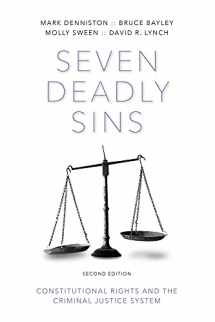
Seven Deadly Sins: Constitutional Rights and the Criminal Justice System
Book details
Summary
Description
Product Description
This textbook brings a fresh approach to the study of constitutional criminal rights in the context of the American criminal justice system. It is intentionally written at a level suitable for an undergraduate. Seven Deadly Sins presents seven core constitutional virtues, introduced to the reader via their mirror opposites, which the authors call the “seven deadly constitutional sins” of the criminal justice system. These negative attributes or “sins” are: intolerance, subterfuge, intrusiveness, craftiness, favoritism, cruelty, and subservience to authority. Some of these negative attributes are housed entirely in one amendment to the constitution (e.g., cruelty) while others span several areas of the Bill of Rights (e.g., subservience to authority).
Each negative trait is presented in two companion chapters. The first of the two chapters introduces the negative trait (e.g., “intolerance”) and establishes its constitutional place via a presentation of various appellate law decisions written in language suitable for an undergraduate student. The second, or companion, chapter then presents real world, non-legal “stories” from the field in the areas of policing and corrections that illustrate the trait using a more “hands-on” approach.
It is this combination of true stories from the field coupled with conceptualizing constitutional rights in terms of their mirror opposites (including the grouping of several amendments at once when necessary) that makes this book unique and fresh.
This second edition of Seven Deadly Sins includes updates to all outstanding cases that had yet to be decided when the first edition of this textbook was published. Additionally, several new cases (primarily odd chapters) and vignettes (primarily even chapters) have been added to the second edition of this textbook:
Chapter 1 updates free exercise litigation concerning polygamy, expands the discussion of RFRA and RLUIPA, and features a new case, Holt v Hobbs, discussing the application of RLUIPA to religious freedom claims by prisoners. Chapter 2 adds a new vignette regarding food allergies for incarcerated persons. Chapter 3 adds a discussion of the application of the Miranda case to physical evidence in U.S v. Patane. Chapter 4 adds new vignettes exploring inmate pen pals as well as the execution drugs used in Nevada. Chapter 5 is reorganized and includes three new cases: Carpenter v. U.S., concerning privacy protections for cell phone location data maintained by wireless providers; Arizona v. Gant, limiting searches incident to arrest involving automobiles; and Utah v. Strieff, expanding the attenuation exception to the exclusionary rule. Chapter 6 adds new vignettes that discuss searches of transgendered inmates and using drones in corrections applications. Chapter 8 includes new vignettes about correctional officers smuggling contraband and former inmates attempting to break back into jail. Chapter 11 adds State v. Houston, with a discussion of how states are responding to the Supreme Court’s juvenile sentencing jurisprudence. Chapter 12 adds new and timely vignettes discussing information regarding the incarceration of offenders during the COVID-19 pandemic and using the Baby Shark song to retaliate against inmates. Chapter 14 updates litigation surrounding prosecution for distributing jury nullification fliers. Chapter 15 includes an expanded discussion of Buck v. Bell as well as the formal overruling of the Korematsu case in Trump v. Hawaii.
About the Author
Mark Denniston is an Associate Professor in the Department of Criminal Justice at Weber State University. Bruce Bayley is a Professor in the Department of Criminal Justice at Weber State University. Molly Sween is an Associate Professor in the Department of Criminal Justice at Weber State University. David Lynch is an Emeritus Professor at Weber State University, where he previously served as Chair of the Department of Criminal Justice.


We would LOVE it if you could help us and other readers by reviewing the book
Book review



